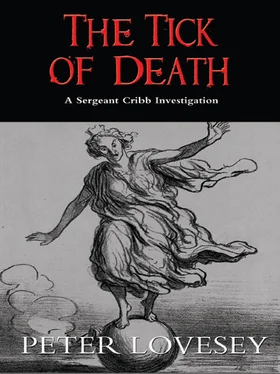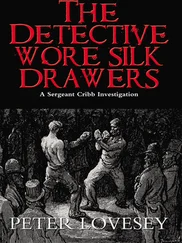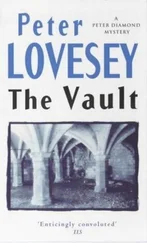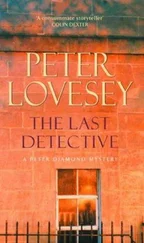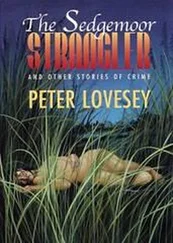Peter Lovesey - The Tick of Death
Здесь есть возможность читать онлайн «Peter Lovesey - The Tick of Death» весь текст электронной книги совершенно бесплатно (целиком полную версию без сокращений). В некоторых случаях можно слушать аудио, скачать через торрент в формате fb2 и присутствует краткое содержание. Жанр: Исторический детектив, на английском языке. Описание произведения, (предисловие) а так же отзывы посетителей доступны на портале библиотеки ЛибКат.
- Название:The Tick of Death
- Автор:
- Жанр:
- Год:неизвестен
- ISBN:нет данных
- Рейтинг книги:3 / 5. Голосов: 1
-
Избранное:Добавить в избранное
- Отзывы:
-
Ваша оценка:
- 60
- 1
- 2
- 3
- 4
- 5
The Tick of Death: краткое содержание, описание и аннотация
Предлагаем к чтению аннотацию, описание, краткое содержание или предисловие (зависит от того, что написал сам автор книги «The Tick of Death»). Если вы не нашли необходимую информацию о книге — напишите в комментариях, мы постараемся отыскать её.
The Tick of Death — читать онлайн бесплатно полную книгу (весь текст) целиком
Ниже представлен текст книги, разбитый по страницам. Система сохранения места последней прочитанной страницы, позволяет с удобством читать онлайн бесплатно книгу «The Tick of Death», без необходимости каждый раз заново искать на чём Вы остановились. Поставьте закладку, и сможете в любой момент перейти на страницу, на которой закончили чтение.
Интервал:
Закладка:
‘More so by the explosion at Victoria in February,’ added Cribb, with an interest in bringing the catalogue briskly up to date. ‘And the simultaneous attempts on London Bridge, Paddington and Ludgate Hill.’
‘What did you say?’ said Jowett, still mentally at Praed Street. ‘Ah, yes, indeed. The railway station outrages. Well, the dynamite party unwittingly did you a good turn, Sergeant, leaving three unexploded machines for us to take to Woolwich and dismantle. You cannot expect to have such good fortune again, however. Next time, the disagreeable things are sure to go off.’
Cribb decided it was time to correct the impression that he had a personal stake in the dynamite campaign. ‘I’m confident that the Special Branch has allowed for that, sir. Some of the best detectives in the Force were conscripted for it. Best leave it all to them, I say.’
‘The Special Branch,’ Jowett repeated distantly. ‘A handpicked group of detectives brought together for the sole purpose of combating the dynamitards. They occupy the room next to mine. I had to give them my telephone-set and two of my clerical assistants. Most inconvenient. Brand-new desks and stools and a hat-stand of their own. Someone in high authority is exceedingly exercised about all this, Cribb.’
‘I’m not surprised, sir. Who’s to say where the next bomb might be placed? For a party of Irish-Americans just off the boat, these dynamiters have an uncanny knack of setting their machines down in public places without being noticed. Each of those stations was well patrolled. And you know how it is with railway station patrols-one constable is always assigned to watch the comings and goings at the cloakroom. What with trunk murders and stolen property and anarchists’ black bags, you need to keep an eye on everyone who approaches the counter. How four large cases containing bombs were deposited the same night at four stations without anyone having any recollection of who left them, I can’t fathom.’
Jowett nodded his agreement. ‘I suppose one must accept that constables on duty are not infallible. There is the possibility, for example, of some person unknown chancing to deliver an infernal machine to the cloakroom in the interval between reliefs, when the new relief are being marched to their beats, but it is quite inconceivable that such a thing could have happened at four stations on one evening. Unless, of course, the dynamite party got to know the times at which the reliefs were changed.’
Cribb was sceptical. ‘Not likely, in my estimation, sir. The recent practice is to vary the reliefs from week to week. One week they might change over at six, the next half-past. It’s all arranged by the divisional Inspectors. The information isn’t given to the men themselves until a day or two before. The dynamiters couldn’t possibly have known it without the co-operation of one of the Force. And that, sir, would mean that we were harbouring an informer.’
Cribb fully expected Jowett to consider the suggestion as scandalous and outrageous as a bare head at Ascot, or braces in the Boat Race. Instead, he lifted his forefinger in front of him in a gesture pregnant with significance.
‘Exactly what I was coming to, Sergeant. What would you say if I told you that one of the Force-one of the Detective Department, indeed-had been seen in the company of Irish-Americans in a public house shortly before the explosion at the Local Government Board, and again before the attacks on the railway stations?’
‘I should find it difficult to believe, sir-unless there was some explanation. Perhaps the officer concerned was a member of the Special Branch.’
‘He was not, Sergeant. Nor did he record any account of the meetings in his daily diary.’
‘Then I should want an explanation, sir,’ decided Cribb. ‘I should call him in and ask him to give an account of himself.’
Jowett smiled in a superior way. ‘Doubtless you would, Sergeant, doubtless you would. It seems the obvious thing to do. However, the obvious thing is not necessarily the most productive of results. If we call the officer in and question his behaviour, the word will not be long in reaching his American associates. Dismissing this man from the Force would be a poor exchange for keeping in contact with the dynamitards, if dynamitards they be.’
Cribb frowned, and said nothing, not a little shocked at the deviousness of what Jowett was suggesting.
The inspector seemed to read his thoughts. ‘You must understand that we are not dealing with petty thieves or one of your backyard murderers, Cribb. We are fighting a secret society pledged to wrench Ireland from Her Majesty’s dominion by every means at its disposal. It is better organised and better financed than any Irish conspiracy this century. It is known as the Clan-na-Gael. Its membership in America runs to thousands, Sergeant, thousands, all organised into numerous subordinate bodies, or camps. The dynamitards are emissaries of the Clan, trained men picked for their daring and knowledge of explosives and sent here to mount a campaign of terror and destruction. Faced with a conspiracy on such a scale as that, we are not going to pounce on the one policeman whose erratic behaviour may help us to defeat the Clan. He will be dealt with when his usefulness to us is over, you may be assured.’
Cribb was floundering. He knew nothing of secret societies. Wasn’t there said to be a War Office Intelligence Department to deal with such things? ‘Might I enquire what connexion this has got with me, sir?’
‘Indeed you may, Sergeant. You have been nominated to make contact with the constable in question and win his confidence.’
‘Me, sir?’
‘If you perform your duties well, Cribb, you may be the first agent to penetrate the dynamite conspiracy in London.’
‘Agent?’ repeated Cribb, eyes agape.
‘No more than a word, Sergeant. I can promise you that the whole of the Special Branch is deeply interested in the outcome of your mission. You will function independently of them, however, and remain responsible to me. It is at my suggestion that you are to be educated in the science of explosives. The closer one gets to the dynamitards, the more necessary it becomes to understand their diabolical machines. Do you follow me?’
‘I’m not sure, sir. Are you proposing that I should infiltrate the dynamite conspiracy by befriending the constable who is suspected of being an informer?’
‘Exactly so, Cribb. And to anticipate your next question, the reason why you have been selected is that you already know the constable in question better than anybody else in the Force. He is your sometime super-numerary and satellite, Detective-Constable Thackeray.’
CHAPTER 2
Long after the cab put them down in Great Scotland Yard, Cribb was deep in conversation with Inspector Jowett. For the first time that day he functioned as a detective. He was totally involved in acquiring information, and he subjected Jowett to the class of interrogation usually reserved for the last suspect in a case of murder. He discharged a volley of questions at the hapless inspector under the blue lamp at the very entrance to the police offices. Nothing in the case against Thackeray escaped his attention. He extracted the evidence the Special Branch had amassed syllable by syllable. Only when he had recorded it all in his notebook and had it checked again by Jowett did he allow him to pass inside. Then, still studying the notes, he walked slowly across the Yard and along Northumberland Avenue in the direction of the Embankment.
There, by the Thames, where he and Thackeray had so often plotted the arrest of dangerous men, Cribb pondered his assistant’s strange conduct. Strange -it was unbelievable that a constable who had faced corpses, crocodiles, even naked chorus girls, in the name of law and order should so abandon his principles as to consort with the dynamite party. Thackeray an informer? Thackeray the lion-hearted, the man above all others he would have at his side in an emergency? Monstrous.
Читать дальшеИнтервал:
Закладка:
Похожие книги на «The Tick of Death»
Представляем Вашему вниманию похожие книги на «The Tick of Death» списком для выбора. Мы отобрали схожую по названию и смыслу литературу в надежде предоставить читателям больше вариантов отыскать новые, интересные, ещё непрочитанные произведения.
Обсуждение, отзывы о книге «The Tick of Death» и просто собственные мнения читателей. Оставьте ваши комментарии, напишите, что Вы думаете о произведении, его смысле или главных героях. Укажите что конкретно понравилось, а что нет, и почему Вы так считаете.
